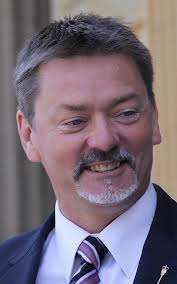All in all, I guess, you could make a good case this was a pretty lousy budget.
It’s deeply confusing, as without any doubt the Alberta government intended, and there are a couple of real disasters lurking in its pages — got kids in post-secondary education, anyone?
But in the aftermath of the Alberta Budget Speech read yesterday afternoon by Progressive Conservative Finance Minister Doug Horner, who was wearing his new flip-flops at the time, you have to admit it was a pretty slick example of expectation management.
The usual suspects on the left and the right quickly attacked Horner’s budget with the usual feigned ardour, as they are expected to do, and from either perspective they probably got it right. But so what? You’ve got to know plenty of their supporters were breathing a sigh of relief and reckoning they’d just dodged another bullet.
NDP Leader Brian Mason, sounding a bit like a broken record, called it a “broken promise budget.” Undoubtedly he’s correct — the question is, will Alberta voters buy Horner’s and Premier Alison Redford’s explanation that things have really changed? The answer: Probably.
Alberta Liberal Leader Raj Sherman called it a “bankrupt budget” — he meant, morally, presumably, because you can’t call any entity with the kind of cash flow Alberta has bankrupt, exactly, even when you’re feeling the uncomfortable pressure of a bitumen bubble passing through.
So are they morally bankrupt for running a cynical but effective campaign, then changing everything? Almost certainly! But will Alberta voters care in three years’ time? Unless something big changes, almost certainly not.
Opposition Wildrose Party Leader Danielle Smith called it the “back-in-debt budget,” trotting out the standard hard-right line that we’re spending beyond our means, a position that may not get a lot of support here, but that admittedly has a certain constituency in this province.
So are we back in debt? Sure. Will anybody care? Well, the Wildrose brain trust can try to make Albertans care and, who knows, maybe some of them eventually will. Or not.
Many more of the usual suspects, from a couple of well-known unions to right-wing Astroturf groups like the Canadian Taxpayers Federation, rolled out some fairly predictable cris de coeur. The Edmonton Journal even sounded a bit like the official arm of the Wildrose Party, trotting out portentous phrases like “opaque, obscure and cynical.” Well, yeah!
But there’s no escaping the sense the Redford Tories cynically but deftly stage-managed the whole thing by rolling out a number of terrifyingly dire hints and rumours in advance — tough decisions, sharp break with the past, significant restraint, yadda-yadda — then announcing actual budget details that seem on their face considerably less drastic.
Of course, we don’t really know yet. Maybe ever.
But faced with a hard-right obsessive about debt and spending, a centre-left ready to view any cuts in health care or social programming as a major betrayal, and influential groups walk away from any exercises in coalition building, Horner managed to leave both sides’ supporters feeling as if they might have just been had, but disinclined to start rushing to the barricades.
There’s still some potential for mischief there — the government’s fight with Alberta’s physicians could still cause them some grief, but they’re sure acting like it works for them. It might not be smart to bet against them on that one!
No one’s conducted an opinion poll just yet — Janet Brown! Tony Coulson! C’mon down! — but it’s said here that in their opaque, obscure and cynical way, the strategic brains behind Alberta’s Progressive Conservative Party managed to hold their centre-right ground a little longer.
And the centre right, if you haven’t happened to notice, is territory quite a lot of Albertans will vote for.
This post also appears on David Climenhaga’s blog, Alberta Diary.



